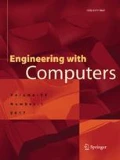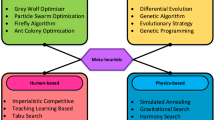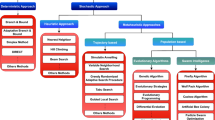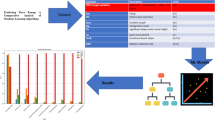Abstract
The present study aims to assess the superiority of the metaheuristic evolutionary when compared to the conventional machine learning classification techniques for landslide occurrence estimation. To evaluate and compare the applicability of these metaheuristic algorithms, a real-world problem of landslide assessment (i.e., including 266 records and fifteen landslide conditioning factors) is selected. In the first step, seven of the most common traditional classification techniques are applied. Then, after introducing the elite model, it is optimized using six state-of-the-art metaheuristic evolutionary techniques. The results show that applying the proposed evolutionary algorithms effectively increases the prediction accuracy from 81.6 to the range (87.8–98.3%) and the classification ratio from 58.3% to the range (60.1–85.0%).



Similar content being viewed by others
References
Donald IB, Chen Z (1997) Slope stability analysis by the upper bound approach: fundamentals and methods. Can Geotech J 34:853–862
Griffiths DV, Lane PA (1999) Slope stability analysis by finite elements. Geotechnique 49:387–403
Su GS, Zhang Y, Chen GQ, Yan LB (2013) Fast estimation of slope stability based on Gaussian process machine learning. Disaster Adv 6:81–91
Rodrigues ÉO, Pinheiro VHA, Liatsis P, Conci A (2017) Machine learning in the prediction of cardiac epicardial and mediastinal fat volumes. Comput Biol Med 89:520–529
Lu P, Rosenbaum MS (2003) Artificial neural networks and grey systems for the prediction of slope stability. Nat Hazards 30:383–398
Sultan N, Savoye B, Jouet G, Leynaud D, Cochonat P, Henry P, Stegmann S, Kopf A (2010) Investigation of a possible submarine landslide at the Var delta front (Nice continental slope, southeast France). Can Geotech J 47:486–496
Zhang G, Cao J, Wang LP (2014) Failure behavior and mechanism of slopes reinforced using soil nail wall under various loading conditions. Soils Found 54:1175–1187
Latifi N, Rashid ASA, Siddiqua S, Majid MZA (2016) Strength measurement and textural characteristics of tropical residual soil stabilised with liquid polymer. Measurement 91:46–54
Moayedi H, Huat B, Thamer A, Torabihaghighi A, Asadi A (2010) Analysis of longitudinal cracks in crest of Doroodzan Dam. Electron J Geotech Eng 15:337–347
Hoang N-D, Pham A-D (2016) Hybrid artificial intelligence approach based on metaheuristic and machine learning for slope stability assessment: a multinational data analysis. Expert Syst Appl 46:60–68
Qi C, Tang X (2018) Slope stability prediction using integrated metaheuristic and machine learning approaches: a comparative study. Comput Ind Eng 118:112–122
Damiano E, Olivares L (2010) The role of infiltration processes in steep slope stability of pyroclastic granular soils: laboratory and numerical investigation. Nat Hazards 52:329–350
Moayedi H, Huat BBK, Kazemian S, Asadi A (2010) Optimization of tension absorption of geosynthetics through reinforced slope. Electron J Geotech Eng 15:93–104
Raftari M, Kassim KA, Rashid ASA, Moayedi H (2013) Settlement of shallow foundations near reinforced slopes. Electron J Geotech Eng 18:797–808
Marto A, Latifi N, Janbaz M, Kholghifard M, Khari M, Alimohammadi P, Banadaki AD (2012) Foundation size effect on modulus of subgrade reaction on sandy soils. Electron J Geotech Eng 17:2015
Gao W, Dimitrov D, Abdo H (2018) Tight independent set neighborhood union condition for fractional critical deleted graphs and ID deleted graphs. Discret Contin Dyn Syst S 12:711–721
Gao W, Guirao JLG, Basavanagoud B, Wu J (2018) Partial multi-dividing ontology learning algorithm. Inf Sci 467:35–58
Gao W, Wang W, Dimitrov D, Wang Y (2018) Nano properties analysis via fourth multiplicative ABC indicator calculating. Arab J Chem 11:793–801
Zhang ZF, Liu ZB, Zheng LF, Zhang Y (2014) Development of an adaptive relevance vector machine approach for slope stability inference. Neural Comput Appl 25:2025–2035
Cheng M-Y, Hoang N-D (2014) Slope collapse prediction using Bayesian framework with k-nearest neighbor density estimation: case study in Taiwan. J Comput Civ Eng 30:04014116
Pinheiro M, Sanches S, Miranda T, Neves A, Tinoco J, Ferreira A, Correia AG (2015) A new empirical system for rock slope stability analysis in exploitation stage. Int J Rock Mech Min Sci 76:182–191
Lyu Z, Chai J, Xu Z, Qin Y (2018) Environmental impact assessment of mining activities on groundwater: case study of copper Mine in Jiangxi Province, China. J Hydrol Eng 24:05018027
Gao W, Guirao JLG, Abdel-Aty M, Xi W (2019) An independent set degree condition for fractional critical deleted graphs. Discret Contin Dyn Syst S 12:877–886
Gao W, Wu H, Siddiqui MK, Baig AQ (2018) Study of biological networks using graph theory. Saudi J Biol Sci 25:1212–1219
Aqeel A, Zaman H, El Aal AA (2018) Slope stability analysis of a rock cut in a residential area, Madinah, Saudi Arabia: a case study. Geotech Geol Eng 2018:1–14
Xiao T, Li D-Q, Cao Z-J, Au S-K, Phoon K-K (2016) Three-dimensional slope reliability and risk assessment using auxiliary random finite element method. Comput Geotech 79:146–158
Varnes DJ, Radbruch-Hall D (1976) Landslides cause and effect. Bull Int Assoc Eng Geol 13:205–216
Pourghasemi HR, Mohammady M, Pradhan B (2012) Landslide susceptibility mapping using index of entropy and conditional probability models in GIS: Safarood Basin, Iran. Catena 97:71–84
Hong H, Miao Y, Liu J, Zhu AX (2019) Exploring the effects of the design and quantity of absence data on the performance of random forest-based landslide susceptibility mapping. Catena 176:45–64
Chen W, Zhang S, Li R, Shahabi H (2018) Performance evaluation of the GIS-based data mining techniques of best-first decision tree, random forest, and naïve Bayes tree for landslide susceptibility modeling. Sci Total Environ 644:1006–1018
Kornejady A, Pourghasemi HR (2019) Producing a spatially focused landslide susceptibility map using an ensemble of Shannon’s entropy and fractal dimension (case study: Ziarat Watershed, Iran), spatial modeling in GIS and R for earth and environmental sciences. Elsevier, Oxford, pp 689–732
He Q, Shahabi H, Shirzadi A, Li S, Chen W, Wang N, Chai H, Bian H, Ma J, Chen Y, Wang X, Chapi K, Ahmad BB (2019) Landslide spatial modelling using novel bivariate statistical based Naïve Bayes, RBF Classifier, and RBF Network machine learning algorithms. Sci Total Environ 663:1–15
Chen W, Pourghasemi HR, Panahi M, Kornejady A, Wang J, Xie X, Cao S (2017) Spatial prediction of landslide susceptibility using an adaptive neuro-fuzzy inference system combined with frequency ratio, generalized additive model, and support vector machine techniques. Geomorphology 297:69–85
Bui DT, Tuan TA, Hoang N-D, Thanh NQ, Nguyen DB, Van Liem N, Pradhan B (2017) Spatial prediction of rainfall-induced landslides for the Lao Cai area (Vietnam) using a hybrid intelligent approach of least squares support vector machines inference model and artificial bee colony optimization. Landslides 14:447–458
Jaafari A, Panahi M, Pham BT, Shahabi H, Bui DT, Rezaie F, Lee S (2019) Meta optimization of an adaptive neuro-fuzzy inference system with grey wolf optimizer and biogeography-based optimization algorithms for spatial prediction of landslide susceptibility. Catena 175:430–445
Tien Bui D, Shahabi H, Shirzadi A, Chapi K, Hoang N-D, Pham B, Bui Q-T, Tran C-T, Panahi M, Bin Ahamd B (2018) A novel integrated approach of relevance vector machine optimized by imperialist competitive algorithm for spatial modeling of shallow landslides. Remote Sens 10:1538
Moayedi H, Mehrabi M, Mosallanezhad M, Rashid ASA, Pradhan B (2018) Modification of landslide susceptibility mapping using optimized PSO-ANN technique. Eng Comput 2018:1–18
Chen W, Panahi M, Tsangaratos P, Shahabi H, Ilia I, Panahi S, Li S, Jaafari A, Ahmad BB (2019) Applying population-based evolutionary algorithms and a neuro-fuzzy system for modeling landslide susceptibility. Catena 172:212–231
Termeh SVR, Kornejady A, Pourghasemi HR, Keesstra S (2018) Flood susceptibility mapping using novel ensembles of adaptive neuro fuzzy inference system and metaheuristic algorithms. Sci Total Environ 615:438–451
Tien Bui D, Khosravi K, Li S, Shahabi H, Panahi M, Singh V, Chapi K, Shirzadi A, Panahi S, Chen W (2018) New hybrids of ANFIS with several optimization algorithms for flood susceptibility modeling. Water 10:1210
Hong H, Panahi M, Shirzadi A, Ma T, Liu J, Zhu A-X, Chen W, Kougias I, Kazakis N (2018) Flood susceptibility assessment in Hengfeng area coupling adaptive neuro-fuzzy inference system with genetic algorithm and differential evolution. Sci Total Environ 621:1124–1141
Pham BT, Prakash I, Singh SK, Shirzadi A, Shahabi H, Bui DT (2019) Landslide susceptibility modeling using reduced error pruning trees and different ensemble techniques: hybrid machine learning approaches. Catena 175:203–218
Chen W, Panahi M, Pourghasemi HR (2017) Performance evaluation of GIS-based new ensemble data mining techniques of adaptive neuro-fuzzy inference system (ANFIS) with genetic algorithm (GA), differential evolution (DE), and particle swarm optimization (PSO) for landslide spatial modelling. Catena 157:310–324
Tien Bui D, Pham BT, Nguyen QP, Hoang N-D (2016) Spatial prediction of rainfall-induced shallow landslides using hybrid integration approach of Least-Squares Support Vector Machines and differential evolution optimization: a case study in Central Vietnam. Int J Dig Earth 9:1077–1097
Demir G, Aytekin M, Akgun A (2015) Landslide susceptibility mapping by frequency ratio and logistic regression methods: an example from Niksar-Resadiye (Tokat, Turkey). Arab J Geosci 8:1801–1812
Chen W, Chai H, Sun X, Wang Q, Ding X, Hong H (2016) A GIS-based comparative study of frequency ratio, statistical index and weights-of-evidence models in landslide susceptibility mapping. Arab J Geosci 9:204
Youssef AM, Pradhan B, Jebur MN, El-Harbi HM (2015) Landslide susceptibility mapping using ensemble bivariate and multivariate statistical models in Fayfa area, Saudi Arabia. Environ Earth Sci 73:3745–3761
Chen W, Yan X, Zhao Z, Hong H, Bui DT, Pradhan B (2019) Spatial prediction of landslide susceptibility using data mining-based kernel logistic regression, naive Bayes and RBFNetwork models for the Long County area (China). Bull Eng Geol Environ 78:247–266
Yang J, Song C, Yang Y, Xu C, Guo F, Xie L (2019) New method for landslide susceptibility mapping supported by spatial logistic regression and GeoDetector: a case study of Duwen Highway Basin, Sichuan Province, China. Geomorphology 324:62–71
Wang Q, Li W, Chen W, Bai H (2015) GIS-based assessment of landslide susceptibility using certainty factor and index of entropy models for the Qianyang County of Baoji city, China. J Earth Syst Sci 124:1399–1415
Yao X, Tham LG, Dai FC (2008) Landslide susceptibility mapping based on support vector machine: a case study on natural slopes of Hong Kong, China. Geomorphology 101:572–582
Zare M, Pourghasemi HR, Vafakhah M, Pradhan B (2013) Landslide susceptibility mapping at Vaz Watershed (Iran) using an artificial neural network model: a comparison between multilayer perceptron (MLP) and radial basic function (RBF) algorithms. Arab J Geosci 6:2873–2888
Polykretis C, Chalkias C, Ferentinou M (2017) Adaptive neuro-fuzzy inference system (ANFIS) modeling for landslide susceptibility assessment in a Mediterranean hilly area. Bull Eng Geol Environ 2017:1–15
Tian Y, Xu C, Hong H, Zhou Q, Wang D (2019) Mapping earthquake-triggered landslide susceptibility by use of artificial neural network (ANN) models: an example of the 2013 Minxian (China) Mw 5.9 event. Geomat Nat Hazards Risk 10:1–25
Lee S, Hong S-M, Jung H-S (2017) A support vector machine for landslide susceptibility mapping in Gangwon Province, Korea. Sustainability 9:48
Pradhan B, Lee S (2010) Regional landslide susceptibility analysis using back-propagation neural network model at Cameron Highland, Malaysia. Landslides 7:13–30
Wu J, Yu X, Gao W (2017) Disequilibrium multi-dividing ontology learning algorithm. Commun Stat Theory Methods 46:8925–8942
Menard S (1995) Applied logistic regression analysis. Sage University Series, Thousand Oaks
Ayalew L, Yamagishi H (2005) The application of GIS-based logistic regression for landslide susceptibility mapping in the Kakuda-Yahiko Mountains, Central Japan. Geomorphology 65:15–31
Hebb DO (1949) The organization of behavior. Wiley, New York
Bottou L (2010) Large-scale machine learning with stochastic gradient descent, Proceedings of COMPSTAT’2010. Springer, Berlin, pp 177–186
Choudhury A, Eksioglu B (2019) Using predictive analytics for cancer identification. In: IISE annual conference, Institute of Industrial and Systems Engineers, Orlando, USA
Kohavi R (1995) The power of decision tables. Springer, Berlin
Nguyen TA, Perkins WA, Laffey TJ, Pecora D (1987) Knowledge-base verification. AI Mag 8:69–75
Larose DT, Larose CD (2014) Discovering knowledge in data: an introduction to data mining. Wiley, New York
Atkeson CG, Moore AW, Schaal S (1997) Locally weighted learning for control. Lazy learning. Springer, Berlin, pp 75–113
Friedman JH (1995) Intelligent local learning for prediction in high dimensions
Dhakate PP, Patil S, Rajeswari K, Abin D (2014) Preprocessing and classification in WEKA using different classifiers. Int J Eng Res Appl 4:91–93
Gao W, Zhu L, Wang K (2015) Ontology sparse vector learning algorithm for ontology similarity measuring and ontology mapping via ADAL technology. Int J Bifurc Chaos 25:1540034
Dorigo M (1992) Optimization, learning and natural algorithms. PhD Thesis, Politecnico di Milano, Italy
Simon D (2008) Biogeography-based optimization. IEEE Trans Evol Comput 12:702–713
Ma H, Simon D (2011) Blended biogeography-based optimization for constrained optimization. Eng Appl Artif Intell 24:517–525
Ergezer M, Simon D, Du D (2009) Oppositional biogeography-based optimization. In: 2009 IEEE international conference on systems, man and cybernetics, San Antonio, TX, USA
Ahmadlou M, Karimi M, Alizadeh S, Shirzadi A, Parvinnejhad D, Shahabi H, Panahi M (2018) Flood susceptibility assessment using integration of adaptive network-based fuzzy inference system (ANFIS) and biogeography-based optimization (BBO) and BAT algorithms (BA). Geocarto Int 34:1–21
Bianchi L, Dorigo M, Gambardella LM, Gutjahr WJ (2009) A survey on metaheuristics for stochastic combinatorial optimization. Nat Comput 8:239–287
Schwefel H-PP (1993) Evolution and optimum seeking: the sixth generation. Wiley, Oxford
Holland JH (1975) Adaptation in natural and artificial systems: an introductory analysis with applications to biology, control, and artificial intelligence. University of Michigan Press, Ann Arbor
Moayedi H, Raftari M, Sharifi A, Jusoh WAW, Rashid ASA (2019) Optimization of ANFIS with GA and PSO estimating α ratio in driven piles. Eng Comput 2019:1–12
Bui X-N, Moayedi H, Rashid ASA (2019) Developing a predictive method based on optimized M5Rules–GA predicting heating load of an energy-efficient building system. Eng Comput 2019:1–10
Davis L (1991) Handbook of genetic algorithms, 1st edn. Van Nostrand Reinhold, New York
Whitley D (1994) A genetic algorithm tutorial. Stat Comput 4:65–85
Ling LY (2016) Participatory search algorithms and applications. Doctorate thesis, School of Electrical and Computer Engineering, Universidade Estadual De Campinas, Brazil
Eberhart R, Kennedy J (1995) A new optimizer using particle swarm theory. In: Proceedings of the sixth international symposium on micro machine and human science, 1995 (MHS'95)
Nguyen H, Moayedi H, Foong LK, Al Najjar HAH, Jusoh WAW, Rashid ASA, Jamali J (2019) Optimizing ANN models with PSO for predicting short building seismic response. Eng Comput 2019:1–15
Nguyen H, Moayedi H, Jusoh WAW, Sharifi A (2019) Proposing a novel predictive technique using M5Rules-PSO model estimating cooling load in energy-efficient building system. Eng Comput 2019:1–10
Kennedy J (2010) Particle swarm optimization. Encyclop Mach Learn 2010:760–766
Poli R, Kennedy J, Blackwell T (2007) Particle swarm optimization. Swarm Intell 1:33–57
Author information
Authors and Affiliations
Corresponding author
Ethics declarations
Conflict of interest
The authors declare no conflict of interest.
Additional information
Publisher's Note
Springer Nature remains neutral with regard to jurisdictional claims in published maps and institutional affiliations.
Rights and permissions
About this article
Cite this article
Yuan, C., Moayedi, H. Evaluation and comparison of the advanced metaheuristic and conventional machine learning methods for the prediction of landslide occurrence. Engineering with Computers 36, 1801–1811 (2020). https://doi.org/10.1007/s00366-019-00798-x
Received:
Accepted:
Published:
Issue Date:
DOI: https://doi.org/10.1007/s00366-019-00798-x




